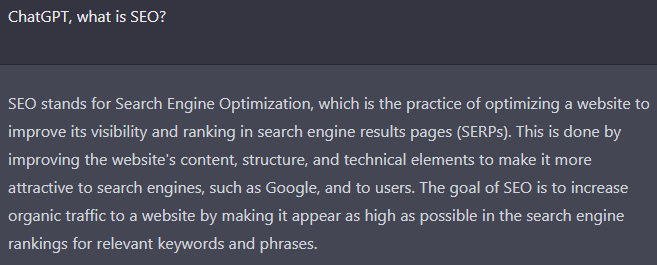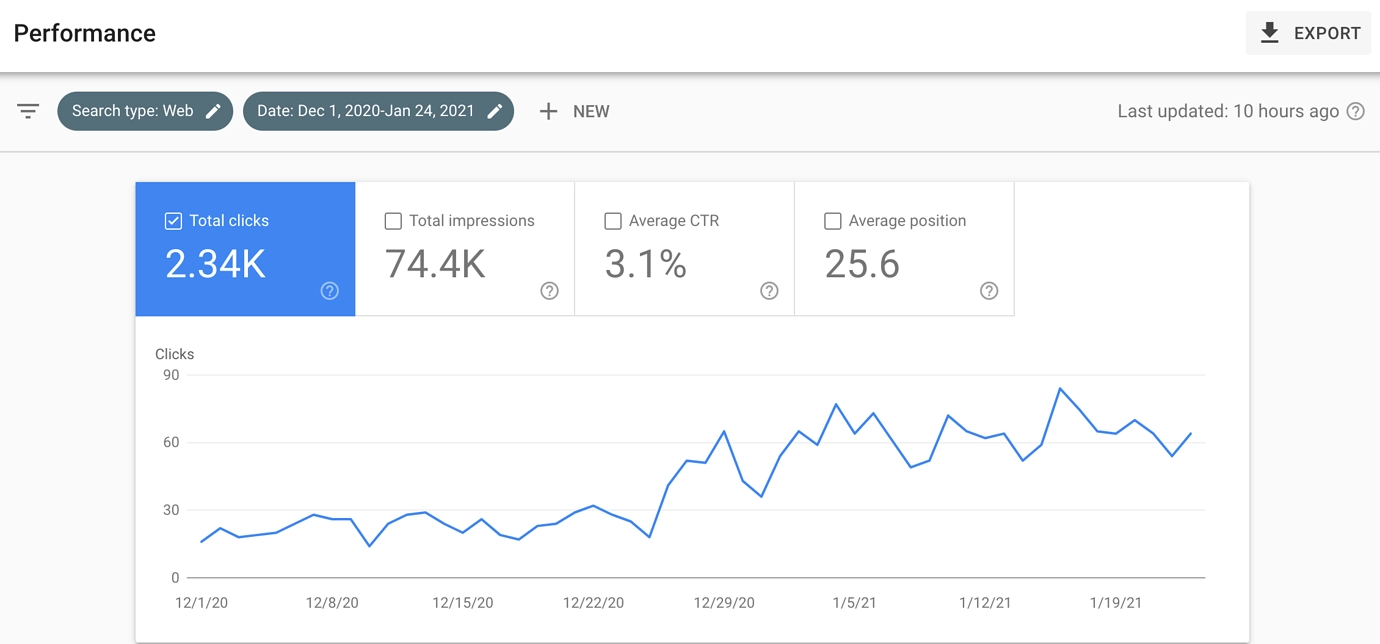Will AI Replace SEO?
There’s a saying in SEO that “content is king” and, as Google keeps telling us, publishing good content is the single best key to ranking in search results.
So, with the advent of AI-generated content, you might think that the days of humans in SEO are numbered.
However, even though AI-generated content will have a significant impact on the world of online marketing, it doesn't mean that the role of SEO and content marketing professionals is going anywhere.
In fact, with the increasing use of AI-generated content, it's more important than ever for marketers to invest time and effort into their SEO, and we’ll explain why...
Artificial Intelligence & SEO
First, let's clarify what we’re discussing…
AI, or artificial intelligence, generally refers to machines performing tasks that we usually associate with human intelligence, like problem-solving, creativity, or language processing.
And SEO, or search engine optimization, generally refers to the practice of making changes to a website to improve its position in search engine results. This can include everything from how a website is coded to building relationships to garner backlinks. We'll call all of this “general" SEO.

As long as some pages rank higher than others for controllable reasons, then SEO will be a thing. The question is…who (or what) will be doing it?
Will AI be able to one day perform ALL of the tasks associated with general SEO?
Maybe? (more on this question below)
But that’s also not what we’re focusing on here. Instead, when people ask about AI replacing SEO, they probably have in mind a question like: Will specific AI-content generators and tools (like ChatGPT) replace a significant portion of the work currently done by content writers for SEO or marketing?
AND, if you are such a professional, you might also be wondering whether AI will be able to take over enough content creation so that your once full-time job becomes just another button click.
The Limitations of AI Content
To defend the honor of content writers and SEO professionals, people are often quick to point out the limitations of current AI technology.
Some limitations of AI content generators include:
- Lack of originality: AI content is often generic or repetitive, lacking the style and creativity required to be truly engaging.
- Factual errors: AI-generated content can easily pass off errors as fact, which could damage a site’s credibility. Just see Google’s embarrassing Bard demo.
- Missing the point: AI generators often fail to fully understand the context and purpose of the content they are generating, leading to content that is off-topic, vague or unfocused.
This is why many (including us) have emphasized the importance of using AI writers in conjunction with human expertise, creativity, and critical thinking, seeing current AI content generators primarily as tools to improve efficiency and save time.
However, in the medium to long-term, I think we can expect AI to improve on and even solve all of these issues to the point where they are no longer a major concern.
If the past few decades are anything to go by, any assessment along the lines of “AI can’t do X” is likely to be wrong eventually.
Why AI Content Is Bad For SEO
The real problem with AI tools is not what they're (currently) bad at. Rather, it's what they're good at. Specifically, the problem with AI content generators is that they can produce a lot of relatively high-quality content quickly.
“But,” I hear you say, “that sounds like a good thing! I WANT to produce a lot of good content quickly.”
Yes of course you do. And so does everyone else.
So with everyone producing more and more good content with relative ease, where does that leave you?
Remember, content doesn’t rank because it’s GOOD. Content ranks because it’s BETTER. So, as higher quality AI-generated content becomes more prevalent, the standard for what Google will rank above the rest will rise.
This means that SEO professionals will have to work even harder to create exceptional content that stands out.
Conversely, as well-written and natural-sounding AI content proliferates, that content will become “bad” simply by being the default. And again, SEOs are going to have to look for more creative and strategic ways to eke out the smallest advantages.

Remember: For competitive searches, ranking on the front page is not about conforming to Google’s guidelines and best practices, it is about exceeding them, and doing so better than your competitors.
How SEO Can Stand Out
So what does it mean to create truly exceptional SEO content in the age of AI? Here are some suggestions…
- Personalized Experiences: AI-generated content often lacks the personal touch, but SEO can help a website rank higher by profiling specific target audiences and tailoring content to them, creating a more personal and engaging experience.
- Understanding Intent: Even where SEO involves content creation, doing it well means going beyond just good writing. It involves understanding intent, client profiles and journeys, and unifying these with a number of other domains. For example, how does buyer intent relate to keywords relates to content relates to social media relates to site authority and so on. Being a good SEO means seeing how these factors fit together.
- Just Be Better: As AI-generated content becomes more common, simply writing well and writing a lot won't cut it. Instead, SEO experts should help websites differentiate themselves by developing a unique voice, brand story, and overall strategy. For example, it’s becoming increasingly important to establish the expertise, authority, and trustworthiness (E-E-A-T) behind a specific piece of content or site, which can be done by explicitly associating content with credible individuals and strategic internal link structures.

What Is The Impact of AI on SEO?
AI will continue to significantly impact diverse aspects of SEO from topic research, to keyword analysis, writing, and more. While the future is uncertain, SEO will likely remain an essential part of digital marketing, regardless of developments in AI, for some time to come.
In conclusion, the rise of AI-generated content is a double-edged sword for the world of SEO.
On one hand, it has the potential to make content creation easier and more accessible. On the other, the increase in quality content makes it harder to stand out and rank higher in search results.
To succeed in today's digital landscape, marketers will have to adapt, and invest time and effort into their SEO and content marketing strategies to create unique, high-quality, and optimized content that truly connects with their audience and sets them apart from the crowd.
FAQ
What is AI content?
The definition of AI content is as varied as the definitions of “AI” and “content”. In short AI content refers to content generated by artificial intelligence algorithms or machine learning models. The content could be in the form of text, images, video, or audio.
Is AI content good for SEO?
AI content can be useful for SEO because it can be created quickly and to a relatively high-standard. However, AI content should still be reviewed and refined by humans to make sure it is accurate, engaging, and follows appropriate search guidelines and best practices.
Why is AI SEO important?
AI SEO is revolutionizing the way content is created and optimized for search engines. By automating time-consuming tasks like keyword research and writing, AI can free up time for other important tasks. As the content playing field is leveled, SEOs will have to work on other strategies to stand out.
Does AI replace content marketers?
AI can automate many tasks involved in content marketing, but is unlikely to completely replace human content marketers. While AI can generate large amounts of content quickly, it doesn’t always understand the nuances of intent and tone. Additionally, human content marketers can bring creativity and expertise to content that is difficult to replicate with AI.
What is Google's stance on AI content?
Google’s current stance is that AI-generated content is not against its guidelines. In official statements, Google repeatedly emphasized the importance of quality and user experience, regardless of how content is created. Google is wary of AI content that comes across as spammy or manipulative.
See our comprehensive blog post covering Google’s changing guidelines around AI-generated content.
How is AI used in content creation?
AI is used to create content by automatically generating text, images, video, or audio based on input data. For example, AI chatbots can write text, including entire articles, based on user provided prompts. AI can also be used to analyze and optimize existing content by identifying keywords, tone, and style, and suggesting changes.
Join the conversation and share your thoughts with our community in the Real Estate Webmasters forums.
